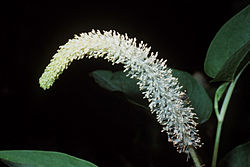Saururus
| Saururus subsp. var. | Lizard's tail | |||||||||||||||||||||||||||||||||||||||||||||||||||||||
|---|---|---|---|---|---|---|---|---|---|---|---|---|---|---|---|---|---|---|---|---|---|---|---|---|---|---|---|---|---|---|---|---|---|---|---|---|---|---|---|---|---|---|---|---|---|---|---|---|---|---|---|---|---|---|---|---|

|
|
| ||||||||||||||||||||||||||||||||||||||||||||||||||||||
| ||||||||||||||||||||||||||||||||||||||||||||||||||||||||
Describe plant here...
| Standard Cyclopedia of Horticulture |
|---|
|
Saururus (Greek, lizard's tail, referring to the curve of the spike of fls.). Saururaceae. Lizard's Tail. Perennial marsh herbs, suitable for the bog-garden. Erect: lvs. heart-shaped, converging-ribbed, petioled, without distinct stipules: fls. crowded in a slender-naked-peduncled terminal spike or raceme; perianth none; stamens mostly 6 or 7, hypogynous: fr. somewhat fleshy, wrinkled, of 3-4 carpels united at base and indehiscent; seed usually solitary.—Two species, one in N. Amer., the other in Asia. CH
|
Cultivation
Propagation
Pests and diseases
Species
Gallery
-
photo 1
-
photo 2
-
photo 3
References
- Standard Cyclopedia of Horticulture, by L. H. Bailey, MacMillan Co., 1963
External links
- w:Saururus. Some of the material on this page may be from Wikipedia, under the Creative Commons license.
- Saururus QR Code (Size 50, 100, 200, 500)
